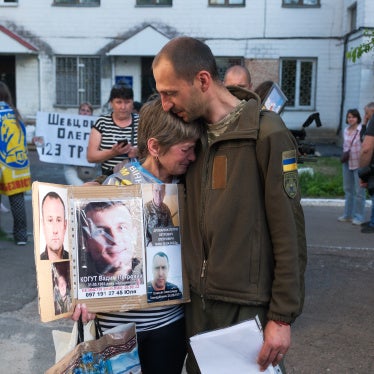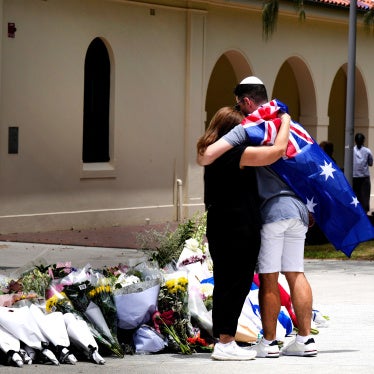(Tripoli) – The discovery on September 8, 2011, of 18 bodies buried in western Libya corroborates reports of the death by suffocation of detainees held by Gaddafi forces in June in the town of al-Khoms, Human Rights Watch said today. Another victim died a few days later, so was not buried with the other 18.
Officials from the military council of al-Khoms, about 120 kilometers east of Tripoli, found the bodies in a remote area between the towns of Bani Walid and Orban. The officials said a captured Gaddafi soldier led them to the spot. The bodies are apparently those of men ranging in age from 23 to 50 who suffocated to death on June 6, when they were held in two metal shipping containers, according to two survivors interviewed by Human Rights Watch.
“The Gaddafi forces threw detainees in metal containers with little water and air on a brutally hot day, and refused to let them out despite cries for help,” said Fred Abrahams, special advisor at Human Rights Watch. “It’s the latest evidence of inhumane treatment faced by Libyans who opposed the Gaddafi regime.”
Human Rights Watch interviewed two survivors of the incident and a third man who was detained and tortured in one of the 40-foot long metal containers prior to the incident. A video, apparently filmed by a Gaddafi soldier on his cell phone, viewed by Human Rights Watch, shows the third man and five other detainees getting kicked and whipped inside the container. Human Rights Watch also saw the 18 exhumed bodies, all of them in an advanced state of decomposition, when they were brought, on September 8, to the Tripoli Medical Center morgue.
According to the two survivors, Gaddafi forces in al-Khoms began arresting men in the town in late spring, after underground rebel groups began harassing and attacking government security forces. From at least May, Gaddafi forces were holding detainees on the grounds of a shuttered Chinese company in the town. Some of the detainees were held in offices and in the workers’ sleeping quarters. Others were held in two metal containers on the company grounds, each ventilated by gunshot holes in their sides.
Mohamed Ahmed Ali, a 54-year-old teacher, said he was arrested on May 20, after he was overheard criticizing Gaddafi. “I was taken to the Chinese company. It was the worst possible treatment,” he said. “As soon as I arrived they used no words, they just started beating me.”
According to Ali, the soldiers used whips and batons that inflicted an electric shock. On September 7, he showed Human Rights Watch the extensive scars on his back from the beatings. He also explained how many of his fellow detainees suffocated to death:
At 11 p.m. [on June 5] they opened the container and put in some food and closed the door. At 4 a.m. we felt it was about 30 degrees [centigrade] in the container. We knew the coming day would not be normal. We prayed to Allah to lessen our suffering. We had 1.5 liters of water for 19 people… By 9 a.m. it was really hot. Our clothes were drenched, I could wring out my shirt. At 11 a.m. people started passing out. I took a broom stick and hit the container from inside saying: “We’re Muslims, we’re Libyans, we’re brothers.” But they just insulted us, called us “rats.”
Ali said he lost consciousness around noon. “Finally they opened it,” he said. “Nine of the 19 were dead. We later heard that in the container next to us nine of the 10 had died.”
The sole survivor from the other container, Abdelrahman Ahmed Sherif, a 23-year-old upholstery worker, said he was arrested on May 16, on allegations that he was handing out anti-Gaddafi pamphlets, and then taken to the Chinese company grounds, where he spent about 20 days.
“They made me lie on the floor and they hit me on the legs, hands and between the legs, also with a Kalashnikov [AK-47 assault rifle],” he said. He told Human Rights Watch what happened on June 6:
We woke up before dawn. The temperature was up. There was a lack of oxygen and no drinking water. Our numbers were high, so we were drinking water quickly. We kept banging on the doors but they didn’t open. They kept insulting us, telling us to shut up. Anyone who closed his eyes would pass out… I saw people passing out. After they opened the door I found that my head was cut. I don’t know how it happened.
According to Sherif, the Gaddafi soldiers put the bodies in a Toyota pickup truck, but he does not know what happened to them next.
Col. Salem Tweer, head of the al-Khoms military council, the local security force that assumed control in the town after Gaddafi forces left in August, said that his forces had taken into custody a Gaddafi soldier who admitted to having buried the bodies. The soldier, whom Tweer declined to name, said that he had received orders to burn the bodies, but he refused the order and buried the bodies in a remote area to the south of al-Khoms.
On September 8, the captured soldier took Tweer and a team from al-Khoms to a remote site called Wadi Dufan between Orban and Bani Walid, about 60 kilometers south of al-Khoms, where they exhumed the 18 bodies. Around 11 p.m. they brought the bodies by truck to the morgue at the Tripoli Medical Center, where they were briefly inspected by Human Rights Watch. Tweer said the bodies were of the men who had died in the containers.
Another man who had been detained in the containers, but released prior to the suffocation deaths, corroborated the claims of regular torture at the Chinese company grounds. Mohanned Jamal Berfad, 22, said he spent 10 days in one of the containers after his arrest, on May 19, on suspicion of having participated in anti-government protests. He told Human Rights Watch:
Since they first brought me in they used electric shocks with an electric baton. They beat us with sticks and kicks, slaps, and punches, and they put their shoes on our heads. They hung us upside down. They had a room for interrogation in the company and they took us there and another room for torture.
Local journalists in al-Khoms showed Human Rights Watch a video they said had been taken from the cell phone of a Gaddafi soldier, which shows three men in green military uniforms kicking and whipping six bound and blindfolded men in a metal container. Mohanned Jamal Berfad watched the video and identified himself as one of the men being beaten. He identified one of the other detainees getting beaten in the video as his cousin Yousef Berfad, 23, who was arrested for having sent information to the Al Jazeera news network.
In one of the rooms in the Chinese company building, Human Rights Watch found metal bars attached to the window and walls, which Sherif said were used to tie up prisoners for beatings. In other rooms in the building, Human Rights Watch found discarded military pants and jackets, as well as the remains of plastic ties, which Ali and Sherif said were used to bind the detainees. In one room were empty boxes of 7.62mm ammunition, standard rounds for AK-47 assault rifles, and empty munitions crates.
The Victims
Yousef Saleh Berfad, 24
Tarek Ben Haleem, 27
Beleed Hamadi, 50
Waleed al Rutbi, 27
Mohammed Ahmed Ehbees, 33
Ali al Taib Abu Sneena, 33
Ausman (Sudanese man, last name unknown), 38
Fathi Sultan, 23
Mohammed Ali Away, 28
Abdul Hameem Al Hbati, 29
Abdul Basit Al Barasi, 39
Mohammed Mohammed al Mabrouk, 40
Muhi Aldeen Mohammed Away, 25
Usama Ali al Marish, 27
Faisal Abdulali Amer, 32
Ali Ibrahim Sultan, 27
Unidentified man from Tarhuna, about 25
Unidentified man from Tarhuna, about 50





